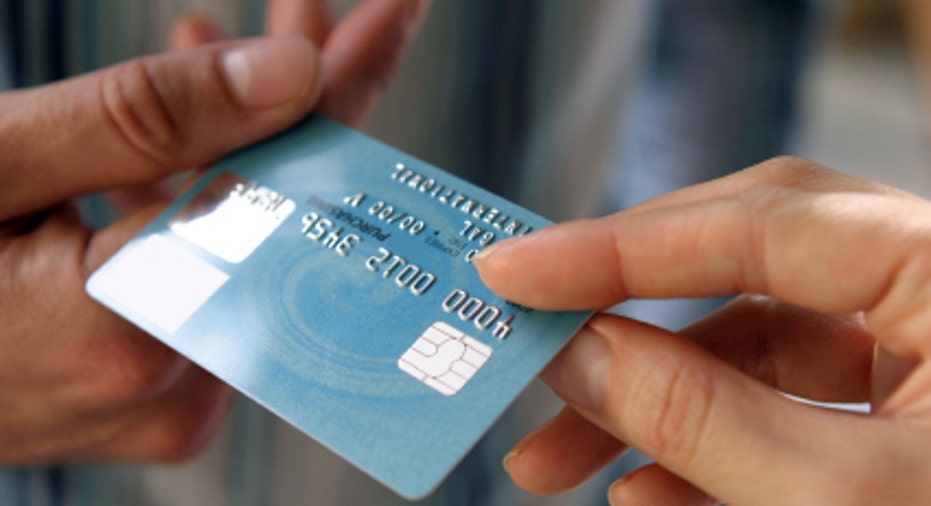Reversing Course Again, Consumer Credit Card Balances Fall in June

Consumer credit card balances tumbled in June after shooting up the previous month, according to new data from the Federal Reserve.
The Federal Reserve's latest monthly G.19 consumer credit report, released Tuesday, showed a 5.1% drop in revolving debt as more people shied away from charging their purchases to credit. Revolving debt, which in the report is made up almost entirely of credit card debt, dropped by $3.7 billion in June to $864.6 billion.
June's drop in revolving debt marks the third time this year that consumers have trimmed their credit card balances, and economists say that rising economic uncertainty deserves much of the blame.
"People are just not sure what the future is going to bring and so consumers are being very careful," says Michael Davis, a professor of economics at the Cox School of Business at Southern Methodist University. "They're trying to deleverage and they're trying to get ahold of their finances, which is probably a good thing."
The Fed's G.19 consumer credit report also looks at nonrevolving debt, which includes auto loans, student loans and loans for mobile homes, boats and trailers. Nonrevolving debt went up 7.2% to $1.7 trillion in June. Because the nonrevolving debt was larger than revolving debt's decrease, overall consumer credit increased, by $6.5 billion. That rise of 3% in June brought total consumer credit to $2.6 trillion.
Consumers face an uncertain economy
Consumers' unwillingness to overspend isn't surprising, say experts, particularly since they are facing significant economic headwinds.
The U.S. economy added 163,000 jobs in July -- a marked increase from the previous two months when it added just 64,000 jobs in June (revised downward from 80,000) and 87,000 jobs in May. However, that wasn't enough to make much of a dent in the number of people who are still searching for work, says the Labor Department. In fact, according to the most recent jobs report, the unemployment rate actually ticked up slightly last month to 8.3%.
Consumers also aren't spending as much as economists hoped on goods and services and that, too, is discouraging businesses from hiring, say experts. Consumer spending was flat in June, according to the Commerce Department, despite slightly higher incomes for some consumers, and retail spending fell for the third straight month, according to the National Retail Federation. As a result, many businesses are waiting for a more dependable customer base before they start to expand.
"A lot of businesses are saying, 'When is demand going to come back? When is the market going to really show up? When are we really going to get a rebound in construction?," asks Cox School of Business's Michael Davis. "And nobody is really able to answer that question, and so we're just kind of bumping along here."
The likelihood that more jobs will come roaring back in the near future is also poor, say economists. The Conference Board's Employment Trends Index -- which measures the probability that the number of jobs will grow -- increased slightly in July after falling the previous month. However, economists are pessimistic that consumers' rosier jobs prospects will last.
"The Employment Trends Index increased slightly in July, but is still below the May level, and is only slightly above the February level, suggesting that slow employment growth is likely to continue in the next few months," said Gad Levanon, director of macroeconomic research at The Conference Board in a statement. "There is no reason to expect employers to rapidly expand their workforce in the current economic environment, and the July pace of job growth (163,000) is unlikely to be sustained."
That negative economic forecast will likely weigh on consumers in the future, say experts, and continue to tamp down spending as they realize that their ability to bounce back from a potential job loss is far from guaranteed.
"When you've got those kinds of uncertainties, if you're thinking rationally, you're going to try to play it very close to the vest," says Jim Roberts, a professor of marketing and an expert in consumer spending at Baylor University. "You're going to save money and you're going to be very reluctant to give up what might be your last paycheck."
That, in turn, could hurt economic growth even further, say experts, since the economy depends on consumers' willingness to make big purchases. "If we have some financial stability, we're much more likely to buy that refrigerator or car or even go out to dinner," says Roberts. However, if we're feeling anxious about our ability to pay our bills, then we're much more likely to stay home and leave our credit cards in our wallet. "Even small purchases may be impacted by consumer uncertainty," he adds.
That said, if the economy defies economists' pessimistic predictions and bounces back more rapidly, consumers are likely to respond by resuming charging to their cards, says Roberts.
He points to past economic downturns as an example. "When the financial storm clouds [appeared], our savings went up, our credit card spending went down," says Roberts. "However, as soon as the clouds started to lift, we stopped saving [and] our credit card debts went up. Once we think we're out of the woods, so to speak, we go back to our profligate ways."
"The only difference here is that we haven't really left the woods," adds Roberts.



















